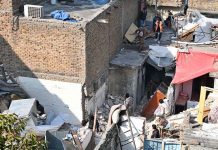By Ali Imran
ISLAMABAD: Islamabad Capital Territory (ICT) Administration has prepared a comprehensive plan to deal with the heatwave which was likely to persist from 15-21 May, 2022, as per information received from National Disaster Management Authority (NDMA).
Accordingly, MCI, CDA and DHO Office Islamabad and Polyclinic dispensaries have been instructed for the establishment of Heat Stroke Centres, said its spokesman on Tuesday.
An awareness campaign for general public about the situation with respect to heat wave has been carried out which covers necessary measures to avoid direct exposure to sunlight especially by senior citizens and children during peak hours between 1000-1700 hours, and judicious use of water for drinking and cooling-off.
An alert has been issued to the health authorities and hospitals in the jurisdiction of Islamabad, he maintained.
Besides, he said Agriculture Directorate and Department of Livestock have been directed to ensure the requirement of water for standing crops, orchards, plantations and cattle.
Emergency services / Fire Brigades have been directed to stay alert against possible fires and undertake preventive measures where ever possible.
Meanwhile, health experts advised the people to stay home and take extra precautions to keep their families and communities safe.
Heat related illnesses can take many forms ranging from a mild case of heat exhaustion to a more serious and life-threatening case of heat stroke, said Akhtar Ali Bandesha, senior cardiologist Pakistan Institute of Medical Sciences (PIMS).
“As several parts of the country are gripping in an intense heat wave, there could be more people to get affected and may be needed medical help”, he warned.
Extreme heat can affect anybody specially those most at risk are older people, young children and people with a medical condition, he said, adding, heatstroke is the common heat-related ailment, which could result in death.
Dr Uzair a private practitioner told APP that heat-related illnesses can range from mild conditions such as a rash or cramps to very serious conditions such as heatstroke, which can be dangerous, adding, elderly people are more prone to heat stress than younger people because their body may not adjust well to sudden or prolonged temperature change.
He further mentioned that summer heat, combined with other factors like intake of contaminated food and water, has led to a spurt in the number of gastroenteritis cases seen in all age groups.
He advised that public should stay hydrated by drinking enough water to flush out toxins from the body, eat fresh fruits, vegetables, and whole grains; avoid the junk, processed, oily, and canned foods; and limit the intake of sodas, colas, and fruit juices.
To a query, he said most common causes of increase in number of cases of various digestive diseases include consumption of contaminated water, contaminated food, lack of healthy living style and anxiety.
Citizens should avoid taking food and junk food items from outside and should use boiled water, clean utensils and must wash hands before meal and keep kitchens clean, he said.
He advised to eat slowly, drink plenty of water and avoid self-medications especially pain killers and patients must follow the instructions given by their doctors and use medicines as advised, he said. “Intense heat will put more stress on human organs like heart and lungs as they function beyond their capacity which could be hazardous”, he observed.




